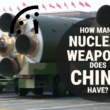An indefensible waste
By Klaus Janberg, May 8, 2015
In Round Two, Baldev Raj and P.R. Vasudeva Rao continued to claim that plutonium reprocessing and breeder reactors offer significant benefits in waste reduction. They also downplayed the economic challenges and proliferation risks associated with breeders and reprocessing. Their views on these issues do not hold up to scrutiny.
Regarding waste, Raj and Rao discussed the failure so far to open the Yucca Mountain nuclear waste repository in the United States. "If all countries with nuclear power sectors adopt a once-through fuel cycle," they wrote, "many Yucca Mountains will be required for waste disposal," which they called "hardly feasible." So doesn't it make sense, their argument runs, to reduce waste volumes through reprocessing? But the fact is that no geological repository for high-level waste is operating anywhere in the world. So what would it matter if waste volumes were reduced through reprocessing? Then again, as I argued in Round Two, a full accounting of waste streams shows that the once-through fuel cycle produces lower waste volumes than breeders and reprocessing.
In any event, a better approach to the waste problem is dry cask storage. A typical nuclear power plant, operating for 50 years, produces waste that, stored in dry casks, could fit in a plant's empty turbine hall. Moreover, this method of storage does not produce the many operational and dismantling wastes that are involved in reprocessing.
Regarding economics, Raj and Rao wrote that "operational experience with reprocessing plants around the world is inadequate" to conclude they are more expensive than light water reactors and the once-through cycle. "France," they wrote, "has pursued a commercial-scale reprocessing and recycling program with good success." I will agree that UP3, France's reprocessing facility for foreign customers, has been a surprising technical success. But commercially, the story is very different. I can testify to this, having been personally involved with the facility to some extent. At one time, France was able to sign reprocessing customers to contracts under cost-plus terms—the customers assumed all risks, from licensing on through to dismantling—because the customers' governments compelled them to sign. These contracts, which never would have been concluded without government pressure, are now expired or expiring. New customers in sufficient numbers are not in the offing, and the French national electricity utility shows no great enthusiasm to fill the order void. And meanwhile, reprocessing facilities in other countries—West Valley in the United States and Sellafield in the United Kingdom—were total failures.
When it comes to proliferation, Raj and Rao argued that plutonium recycling is a "nonproliferation measure"—but, as Hui Zhang has already pointed out, plutonium must be separated before it can be recycled, making it much more susceptible to misuse than if it were still contained in spent fuel. Again, dry cask storage is a better option. Spent fuel's high radioactivity protects it against theft for more than 150 years. Isn't a century and a half long enough to determine whether plutonium recycling is really necessary?
I am convinced that allocating large sums of money to fast breeder reactors over the next 30 years—a time period during which breeders and reprocessing cannot reach economic maturity—is an indefensible waste. Better alternatives for investment exist. I will not claim that Germany's Energiewende, or energy transformation, is an exemplary alternative. In fact, I consider it very wasteful. But investment should be directed toward the promising energy alternatives that do exist—not toward breeder reactors and plutonium reprocessing.
Topics: Nuclear Energy, Nuclear Weapons
Share: [addthis tool="addthis_inline_share_toolbox"]














